Text
2 Remarkable writers in the Period of New Society

Nick Joaquin: A highly regarded writer and journalist, Joaquin wrote extensively during the period of new society. His works included novels, short stories, and essays that captured the changing social and political landscape of the Philippines during this time, including "The Woman Who Had Two Navels" and "Reportage on Crime."

F. Sionil Jose: A prolific author and essayist, Jose wrote several novels and works of non-fiction during the period of new society, including "The Rosales Saga," a five-part epic that chronicled the struggles of Filipino society from the Spanish colonial period to the present.
2 Remarkable writers in the Period of Third Republic

Jose Garcia Villa: A celebrated poet and writer, Villa was known for his innovative and experimental approach to literature. During the period of the Third Republic, he continued to push the boundaries of traditional forms and conventions, producing works such as "Have Come, Am Here" and "Selected Poems and New."

Jessica Hagedorn: A novelist, playwright, and poet, Hagedorn's works explored themes of identity, race, and cultural displacement. She gained international recognition during the period of the Third Republic for her novel "Dogeaters," which vividly portrayed the social and political realities of life in the Philippines during the Marcos regime.
2 Remarkable writers in Post EDSA 1 Revolution

Jose Dalisay Jr.: A writer and academic, Dalisay's works spanned multiple genres, including novels, essays, and plays. During the post-EDSA 1 revolution period, he produced several critically acclaimed works, including "Killing Time in a Warm Place" and "Soledad's Sister."

Lourd Ernest H. de Veyra: A writer, poet, and musician, de Veyra's works often deal with themes of social commentary and political satire. During the post-EDSA 1 revolution period, he emerged as a prominent voice in Philippine literature and popular culture, producing works such as "Super Panalo Sounds!" and "The Best of This is a Crazy Planets."
2 notes
·
View notes
Text
2 Remarkable writers in period of Enlightenment:
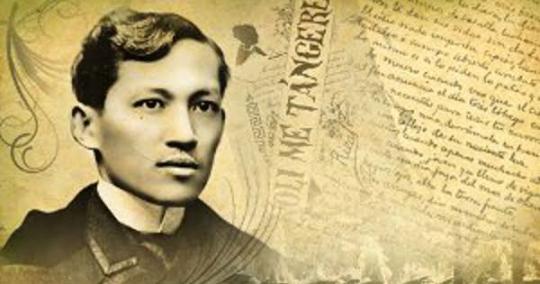
Jose Rizal is considered as one of the most important figures in the period of Enlightenment. He was a writer, a physician, and a revolutionary who used his literary works to advocate for the country's independence from Spain. Rizal's most notable contribution in this period is his novel "Noli Me Tangere," which exposed the injustices and corruption of the Spanish colonial government in the Philippines. This novel served as an inspiration for the Philippine Revolution in 1896.
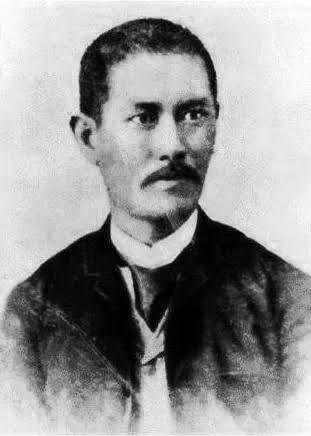
Graciano Lopez Jaena was also a prominent writer during the period of Enlightenment. He was a journalist, essayist, and political activist who used his writing to criticize the Spanish colonial government in the Philippines. Lopez Jaena's most notable contribution in this period is his essay "Fray Botod," which exposed the hypocrisy and corruption of the Spanish friars in the Philippines.
2 Remarkable writers in Period of American Regime:

Nick Joaquin, a Filipino writer and journalist, was notable during the American regime. He is known for his short stories and plays that often tackle issues of national identity, colonialism, and social justice. Joaquin's most notable contribution in this period is his play "A Portrait of the Artist as Filipino," which explores the struggle of Filipino artists during the American colonization of the Philippines. The play is a powerful critique of the cultural and social changes brought by the American presence in the country.

Lope K. Santos was also a prominent writer during the American regime. He was a novelist and labor leader who used his writing to advocate for workers' rights and social justice. Santos' most notable contribution in this period is his novel "Banaag at Sikat," which tells the story of two brothers who join the labor movement in the Philippines. The novel is a powerful critique of the oppressive colonial system and a call for workers' solidarity and empowerment.
2 Remarkable writers in Japanese Period
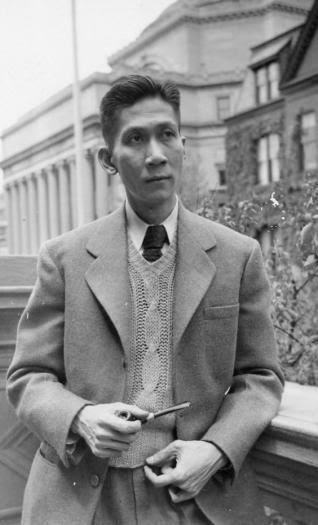
During the Japanese occupation, the Philippines experienced a significant decline in literature due to strict censorship laws. Nevertheless, one notable writer during this period was Jose Garcia Villa. Villa was a poet who pioneered the use of "comma poems," a form of poetry that relies on the use of commas to create pauses and rhythm. Villa's poems often tackle themes of love, death, and spirituality, and his work paved the way for the development of modernist poetry in the Philippines.

NVM Gonzalez was also a prominent writer during the Japanese period. He was a novelist and essayist who used his writing to explore the complexities of Filipino identity and culture. Gonzalez's most notable contribution in this period is his novel "The Winds of April," which tells the story of a family's struggle to survive during the Japanese occupation. The novel is a powerful critique of the violence and chaos of war and a call for resilience and hope in the face of adversity.
2 Remarkable writers in the Philippine literature in English

Francisco Arcellana is one of the most prominent writers during the period of Philippine literature in English. He is known for his short stories that often explore the complexities of human relationships and emotions. Arcellana's most notable contribution in this period is his short story "The Mats," which tells the story of a family's struggles to overcome grief and loss. The story is considered as one of the best examples of Philippine literature in English.

Nick Joaquin also continued to produce significant works during the period of Philippine literature in English. His most notable contribution in this period is his novel "The Woman Who Had Two Navels," which explores the themes of identity, colonialism, and cultural conflict. The novel is a powerful critique of the Philippines' complex history and a call for self-discovery and empowerment.
2 Remarkable writers in the Period of Activism

Jose Maria Sison: A prolific writer and founder of the Communist Party of the Philippines, Sison wrote numerous political essays and poems during this period, including his influential work "Philippine Society and Revolution."
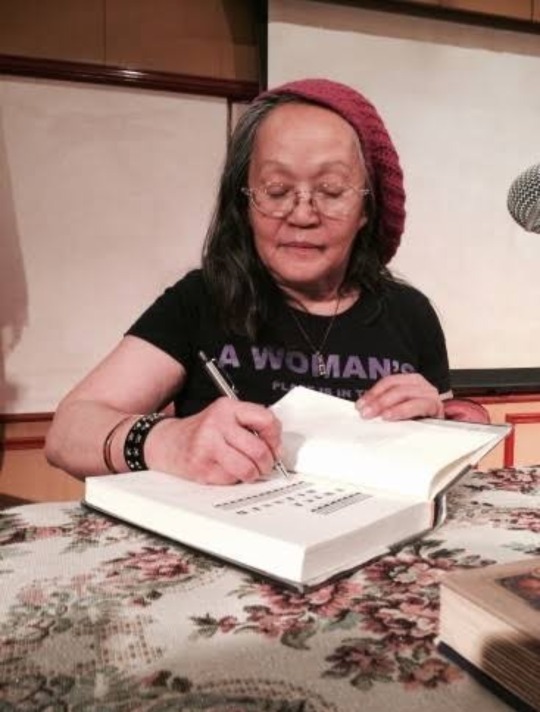
Ninotchka Rosca: A feminist writer and activist, Rosca wrote several novels and short stories during the period of activism, including "State of War" and "The Monsoon Trilogy," which explored themes of social justice, human rights, and women's liberation.
0 notes
Text
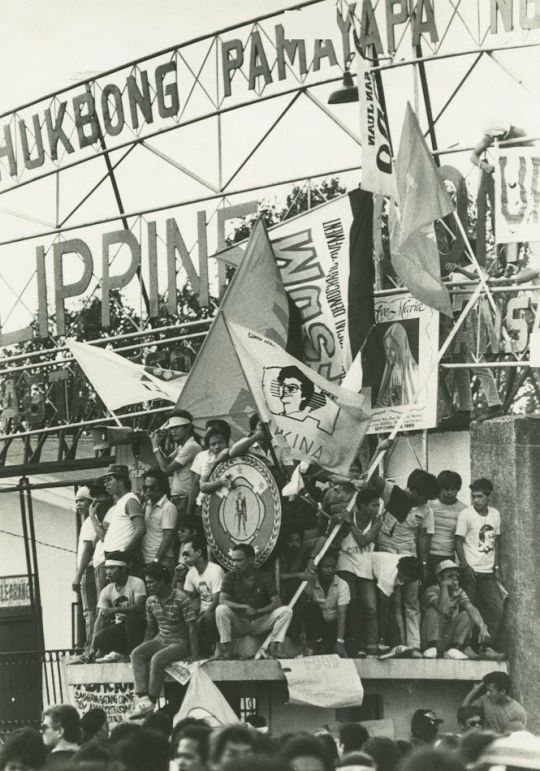
-Short article about the period of new society-
New Society Philippine Literature
The period of the New Society in Philippine literature refers to the time period from 1972 to 1986, during which the Philippines was under the authoritarian rule of President Ferdinand Marcos. This period was marked by political turmoil, social unrest, and censorship, which had a significant impact on the literary output of the country.
One of the key features of this period was the emergence of what is known as "committed literature." This type of literature was characterized by a strong sense of social and political consciousness, with writers using their works to critique the government and the societal issues of the time. Writers like Jose F. Lacaba, Ninotchka Rosca, and Jose Garcia Villa were prominent figures during this period, and their works often tackled themes of oppression, injustice, and resistance.
However, the period of the New Society was also marked by censorship and repression of artistic expression. The government imposed strict controls on the media and the arts, leading to a culture of self-censorship among writers and artists. Many writers were also forced into exile or silenced altogether, with some even facing imprisonment or torture for their political views.
Despite the challenges faced by writers during this period, the literature of the New Society remains an important part of Philippine literary history. It represents a period of resistance and struggle against authoritarianism and a testament to the power of literature to speak truth to power.
In conclusion, the period of the New Society in Philippine literature was a time of political turmoil and social upheaval, marked by censorship and repression of artistic expression. However, it was also a period of resistance and struggle, with writers using their works to critique the government and the societal issues of the time. Despite the challenges faced by writers during this period, their contributions remain an important part of Philippine literary history.
https://martiallawmuseum.ph/magaral/promises-of-the-new-society/
0 notes
Text

-Article about post-EDSA revolution Philippines literature
Post-EDSA Philippine Literature.
The EDSA Revolution of 1986, also known as the People Power Revolution, was a significant moment in Philippine history. It marked the end of the authoritarian regime of Ferdinand Marcos and ushered in a new era of democracy and freedom for the Filipino people. But beyond the political upheaval, the revolution had a profound impact on Philippine literature. In this article, we will explore the post-EDSA revolution's contribution to Philippine literature.
Before the EDSA Revolution, Philippine literature was dominated by writers who tackled themes of oppression, corruption, and injustice. Writers like Jose Rizal, Nick Joaquin, and Francisco Balagtas were known for their poignant depictions of Philippine society and the struggles of the Filipino people. However, during the Marcos dictatorship, censorship was rampant, and writers had to be careful not to offend the government. Many works were banned or heavily censored, and writers who dared to speak out against the regime were often harassed, imprisoned, or even killed.
With the fall of Marcos, Philippine literature underwent a transformation. Writers were now free to explore new themes and write without fear of censorship or persecution. They began to tackle issues that were previously taboo, such as sexuality, gender, and identity. They also began to experiment with new forms of writing, such as postmodernism and magical realism.
One of the most significant contributions of post-EDSA literature was its focus on the marginalized and the oppressed. Writers began to give voice to the voiceless, portraying the struggles of the poor, the indigenous, and the LGBT community. They explored the complexities of Philippine society, including its history of colonialism, poverty, and political corruption.
The works of authors like Jessica Hagedorn, Jose Garcia Villa, and F. Sionil Jose were instrumental in shaping the post-EDSA literary landscape. Hagedorn's novel, "Dogeaters," was a scathing critique of Philippine society, portraying the corruption and decadence of the elite. Villa's poetry, on the other hand, was known for its experimental style, using innovative forms and language to convey his message. Jose's novels, such as "The Rosales Saga," explored the lives of ordinary Filipinos and the impact of colonialism on their identity.
The emergence of feminist literature was another significant development in post-EDSA literature. Female writers began to explore issues of gender, sexuality, and power, challenging the traditional roles assigned to women in Philippine society. The works of writers like Ninotchka Rosca, Lualhati Bautista, and Carmen Guerrero Nakpil were instrumental in promoting gender equality and women's rights.
The growth of Philippine literature after the EDSA Revolution was not limited to the written word. It also saw the rise of independent publishing, literary journals, and literary festivals. These platforms provided writers with opportunities to showcase their work and engage with a wider audience.
In conclusion, the post-EDSA revolution had a profound impact on Philippine literature. It gave writers the freedom to explore new themes, experiment with new forms of writing, and give voice to the marginalized and the oppressed. It paved the way for a new generation of writers who continue to shape the literary landscape of the Philippines today. The revolution proved that literature can be a powerful tool for social change, a means of expressing dissent, and a platform for promoting democracy and freedom.
https://www.manilatimes.net/2023/02/28/opinion/columns/the-edsa-people-power-revolution-of-1986/1880589
0 notes
Text

𝗔𝗖𝗧𝗜𝗩𝗜𝗦𝗠
In the period of activism,
Philippine literature thrived,
As voices of disagree
Echoed loud and clear,
Their words like a rallying cry
For change and liberation near.
Poets write fiery lines,
Unleashing their rage and pain,
As they fought against the burden,
And societal despite,
Their verses a call to arms
For the masses to break their chains.
Novels describe the struggle
Of a people long oppressed
As they fought for independence
And their right to self-determination expressed
Their stories a testament
To the power of the oppressed.
Plays were staged in protest
Against a government unjust,
As actors took the stage
To bring the people's pledge to trust
Their performances a mirror
Of a society work with distrust.
In the period of activism
Philippine literature thrive
As artists used their craft
To fight for a world that's just
Their works a reminder
Of the power of the written word's thrust.
#Activism
0 notes
Text

𝗛𝗼𝗽𝗲
𝑺𝒕𝒖𝒄𝒌 𝒊𝒏 𝒂 𝒑𝒊𝒕 𝒐𝒇 𝒅𝒆𝒔𝒑𝒂𝒊𝒓
𝑳𝒊𝒇𝒆'𝒔 𝒂𝒅𝒗𝒆𝒓𝒔𝒊𝒕𝒊𝒆𝒔 𝒕𝒐 𝒃𝒆𝒂𝒓
𝑺𝒐𝒐𝒏 𝒆𝒏𝒐𝒖𝒈𝒉 𝒕𝒉𝒆 𝒇𝒊𝒓𝒆 𝒑𝒂𝒔𝒔𝒆𝒔
𝑩𝒆𝒂𝒖𝒕𝒚 𝒊𝒏 𝒑𝒍𝒂𝒄𝒆 𝒐𝒇 𝒂𝒔𝒉𝒆𝒔
#TANAGA
1 note
·
View note
Text

𝗗𝗲𝗲𝗽 𝗮𝗳𝗳𝗲𝗰𝘁𝗶𝗼𝗻
𝑨𝒍𝒍𝒐𝒘 𝒎𝒚 𝒆𝒚𝒆𝒔 𝒕𝒐 𝒋𝒖𝒔𝒕 𝒈𝒍𝒐𝒘
𝑨𝒔 𝑰 𝒔𝒆𝒆 𝒕𝒉𝒆 𝒋𝒐𝒚 𝒊𝒏 𝒚𝒐𝒖
𝑴𝒚 𝒕𝒆𝒂𝒓𝒅𝒓𝒐𝒑𝒔 𝒕𝒉𝒂𝒕 𝒐𝒗𝒆𝒓𝒇𝒍𝒐𝒘
𝑾𝒂𝒏𝒕𝒔 𝒕𝒐 𝒇𝒂𝒅𝒆 𝒊𝒏𝒕𝒐 𝒕𝒉𝒆 𝒃𝒍𝒖𝒆
#TANAGA
1 note
·
View note
Text

𝗧𝗿𝗮𝗻𝗾𝘂𝗶𝗹𝗶𝘁𝘆
𝑳𝒆𝒕 𝒎𝒆 𝒑𝒐𝒔𝒔𝒆𝒔𝒔 𝒑𝒆𝒂𝒄𝒆 𝒐𝒇 𝒎𝒊𝒏𝒅
𝑭𝒐𝒓 𝑰 𝒄𝒂𝒏𝒏𝒐𝒕 𝒔𝒍𝒆𝒆𝒑 𝒂𝒕 𝒏𝒊𝒈𝒉𝒕
𝑳𝒆𝒕 𝒎𝒆 𝒍𝒆𝒂𝒗𝒆 𝒎𝒚 𝒅𝒐𝒖𝒃𝒕𝒔 𝒃𝒆𝒉𝒊𝒏𝒅
𝑳𝒆𝒕 𝒎𝒆 𝒋𝒖𝒔𝒕 𝒕𝒉𝒊𝒏𝒌 𝒐𝒇 𝒅𝒆𝒍𝒊𝒈𝒉𝒕
#TANAGA
1 note
·
View note
Text

𝗙𝗮𝗸𝗲 𝗳𝗿𝗶𝗲𝗻𝗱𝘀
𝑻𝒉𝒆𝒚 𝒑𝒖𝒔𝒉𝒆𝒅 𝒎𝒆 𝒖𝒑 𝒇𝒓𝒐𝒎 𝒅𝒂𝒓𝒌𝒏𝒆𝒔𝒔
𝑨𝒏𝒅 𝒔𝒉𝒐𝒘𝒆𝒅 𝒕𝒉𝒆 𝒓𝒆𝒂𝒍 𝒉𝒂𝒑𝒑𝒊𝒏𝒆𝒔𝒔
𝑩𝒖𝒕 𝒊𝒕'𝒔 𝒋𝒖𝒔𝒕 𝒂 𝒇𝒂𝒍𝒍𝒂𝒄𝒚
𝑻𝒉𝒆𝒚 𝒓𝒆𝒗𝒆𝒂𝒍𝒆𝒅 𝒉𝒚𝒑𝒐𝒄𝒓𝒊𝒔𝒚
#TANAGA
1 note
·
View note
Text

𝗠𝘆 𝗹𝗼𝘃𝗲𝗱
𝑨𝒍𝒍𝒐𝒘 𝒎𝒚 𝒉𝒆𝒂𝒓𝒕 𝒕𝒐 𝒆𝒏𝒋𝒐𝒚
𝑻𝒉𝒆 𝒂𝒄𝒄𝒐𝒓𝒅 𝒂𝒏𝒅 𝒉𝒂𝒓𝒎𝒐𝒏𝒚
𝑴𝒚 𝒂𝒊𝒎 𝒊𝒔 𝒏𝒐𝒕 𝒕𝒐 𝒂𝒏𝒏𝒐𝒚
𝑩𝒖𝒕 𝒕𝒐 𝒎𝒂𝒌𝒆 𝒚𝒐𝒖 𝒇𝒆𝒆𝒍 𝒉𝒂𝒑𝒑𝒚
#TANAGA
1 note
·
View note




